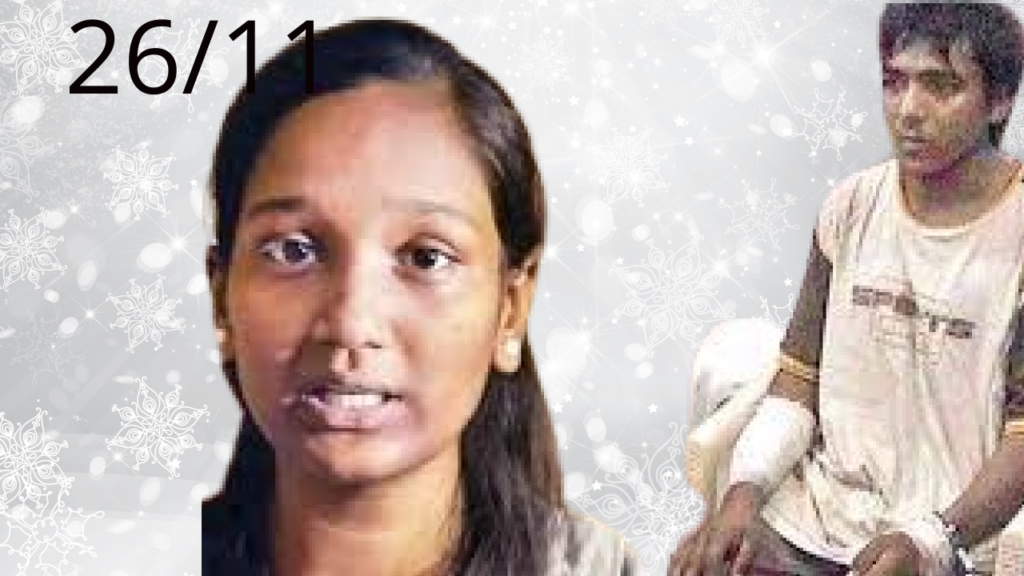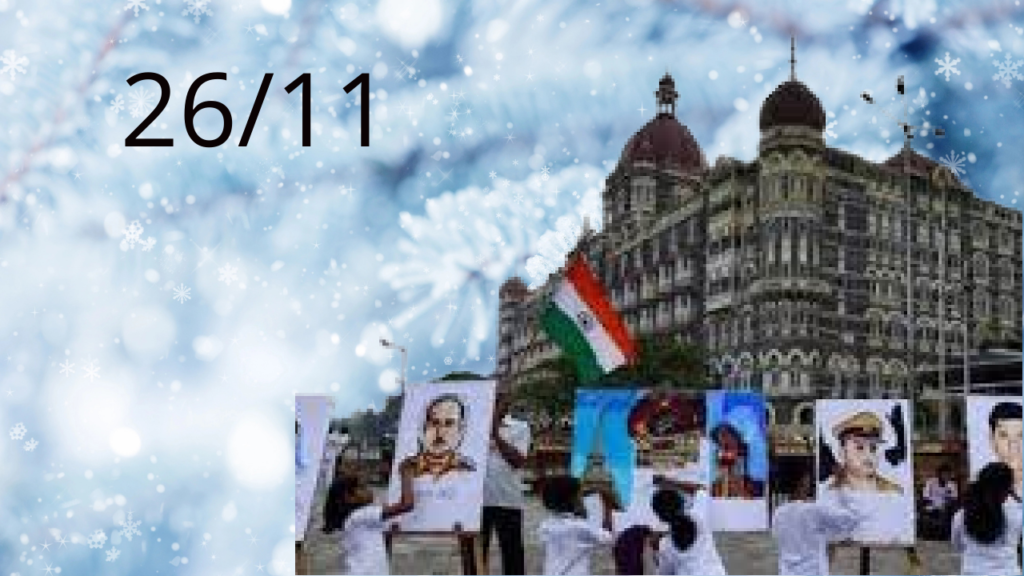Introduction:
Devika Rotawan: The Valiant Survivor of the Mumbai Attacks on November 26, 2011 .Survivor Devika Rotawan remembers the fatal night at Chhatrapati Shivaji Maharaj Terminus (CSMT), where she was shot at the age of nine, sixteen years after the horrific 26/11 Mumbai terrorist attacks. Ajmal Kasab, the only terrorist apprehended alive, was found guilty thanks in large part to her testimony. While she waits for the promised accommodation, Devika, who is now 25 years old, advocates for victims despite her emotional and physical scars.
Table of Contents
The Fateful 26/11 Night
When the horror struck, Devika was on her way to Pune to meet her older brother with her father and brother. As they reached CSMT, the station was shaken by an explosion, and then there was random firing. “People of all ages were badly injured,” she remembered. Her leg was struck by a gunshot, and the discomfort persists, particularly in the winter.
She was first treated at St. George Hospital, but as her condition deteriorated, she was sent to JJ Hospital so that the bullet could be removed surgically.”I lost consciousness for some time and needed more than a month to fully recover,” she explained. Her family instantly accepted when Mumbai’s Crime Branch asked her to testify, despite the fact that the incident left her traumatized for life.
In court with Ajmal Kasab
During Ajmal Kasab’s trial, Devika proved to be an important witness by identifying him. “My father and I saw the terrorists, therefore we decided to testify. “I recognized Kasab, the one who had caused us so much pain,” she stated.Despite her youth, her determination remained unwavering. “I wished to personally punish him, but the only thing I could do was point him out in court,” she mentioned. In 2012, Kasab, the lone terrorist apprehended alive, was put to death.
After the Attack, Life
Devika, who lost her mother in 2006, originally wanted to fight terrorism as an officer. “Terrorism needs to stop. Speaking out against injustices in our society, people must demand accountability, especially with relation to cross-border terrorism, she stated. Although there was a lot of support, some family members separated following the incident, but they have since gotten back in touch.
Devika, a recent graduate living in a rented home in Bandra East, is still proud of her bravery despite her ongoing health problems. “My leg continues to ache, particularly during winter, but I take pride in standing up for what is right.” It is necessary for people to come forward and assist victims.
Awaiting the Support That Was Promised

Like other survivors, Devika was given ₹3.26 lakh as initial compensation. The Bombay High Court has ordered the Maharashtra government to give careful consideration to her request for economically weaker section (EWS) housing, and former Chief Minister Devendra Fadnavis contributed ₹10 lakh for her medical care. She is still awaiting possession of the house that has been assigned to her.
The Dark Chapter of the 26/11 Attacks
Ten Pakistani terrorists entered Mumbai by water on November 26, 2008, and carried out coordinated attacks on famous sites such as the Oberoi Trident, the Taj Mahal Palace Hotel, and CSMT. 166 people were killed in the tragedy, including 18 security guards, and several others were injured.”Prominent figures, including Major Sandeep Unnikrishnan and ATS Chief Hemant Karkare, were counted among the casualties.”. Nine terrorists were killed by security troops, and Kasab was taken alive.
Devika calls for solidarity against terrorism and remembering the victims as the anniversary of 26/11 draws near. “Terrorism must be eradicated, and people must stand with victims to ensure their struggles are not forgotten,” she said.
In his condolences, Prime Minister Narendra Modi reaffirmed India’s commitment to fighting terrorism and warned that groups that pose a threat to national security would be met with a “strong response.”
PM Modi Honors the 26/11 Victims and Reaffirms India’s Commitment to Combating Terrorism
Prime Minister Narendra Modi stressed on Tuesday that terrorist groups posing a threat to India’s security would receive a “suitable response.” He pondered on India’s democratic values and resiliency while speaking at the Supreme Court’s Constitution Day program, which honored the victims of the 2008 Mumbai attacks.
Recalling 26/11
As we commemorate this significant festival of democracy, we must remember that it is also the anniversary of the Mumbai terror attacks, Prime Minister Modi stated. I honor those who perished in this horrific act of terrorism and reaffirm India’s determination to take firm action against any group endangering the security of our country.
He emphasized how crucial the Constitution is as a guide for all citizens, not just those in the legal profession. He said, “Our Constitution is not just a legal document; it is a beacon of guidance for everyone,” pointing out how it has guided the country through difficult times, such as the Emergency era.
“We are celebrating Constitution Day in Jammu and Kashmir under the full framework of Baba Saheb Ambedkar’s Constitution for the first time,” PM Modi said, acknowledging the historic milestone of the Indian Constitution’s full implementation in the region
.
A Demand for Justice and Accountability
In his reflection on the 26/11 attacks, the prime minister emphasized the need for swift action against terrorism while quietly criticizing the then-government’s tardy response. “India’s resolve is crystal clear: any terrorist organization threatening our security will face an appropriate retaliation,” he proclaimed.
Drawing inspiration from the ideals portrayed in the original Constitution, which include characters like Ram, Sita, Hanuman, Buddha, Mahavir, and Guru Nanak, Modi highlighted in his speech his government’s commitment to guaranteeing justice and dignity for all citizens.
“These humane values are the foundation of our policies, which strive for social justice and a respectable standard of living for all citizens,” he stated.

Dedicated to Constitutional Principles
Citing Dr. Rajendra Prasad, who advocated for leadership that puts the country’s needs ahead of individual interests, PM Modi reaffirmed his government’s “Nation First” tenet. “The Constitution is our guiding light, and I strive to perform my duties within its framework,” Modi stressed in response to Supreme Court Bar Association President Kapil Sibal’s worries over judicial independence.
The Role of the Judiciary in Maintaining Trust and Balance
Sanjiv Khanna, the Chief Justice of India, emphasized the judiciary’s sensitive role in maintaining accountability, transparency, and public trust while juggling opposing rights. In response to political criticism that has referred to the court as a “unelected tyranny,” CJI Khanna clarified that judicial independence guarantees that decisions are made impartially, without interference from outside forces, and in accordance with the Constitution and the law alone.
Imagine a society in which judges run for office, make pledges, and ask the public for approval of their rulings.”The judiciary stands as the most robust pillar of governance, thanks to its fairness and commitment to upholding justice,” he remarked.
In his speech, Prime Minister Modi stressed the nation’s commitment to maintaining justice and security, the strength of the Constitution, and solidarity against terrorism as India marks Constitution Day and honors the victims of the 26/11 attacks.
PM Modi Reaffirms India’s Resolve Against Terrorism on the 26/11 Anniversary; CJI Highlights the Effectiveness of the Judiciary Despite Growing Caseload
In spite of the urgent problem of more than 50 million cases still waiting in Indian courts, Chief Justice of India (CJI) Sanjiv Khanna praised the judiciary’s outstanding case-resolution capabilities. Efficiency and public confidence in the legal system are demonstrated by the trial courts’ 102% disposal rate and the Supreme Court’s 97% this year.
“After Justice B.R., Justice Surya Kant expressed his vote of thanks.”. Gavai gave the welcome address. The importance of the rule of law in the judiciary was emphasized in their statements. Arjun Ram Meghwal, Minister of State for Law and Justice, also underlined how the Constitution is dynamic and supports social justice policies.
PM Modi on the 26/11 Anniversary and Constitution Day
In his speech, Prime Minister Narendra Modi reiterated India’s determination to provide a “fitting response” to any terrorist groups endangering the country’s security. “On this day, we also mark the anniversary of the horrific terrorist attacks in Mumbai,” he said, paying respect to the victims of the 26/11 Mumbai terror strikes. I honor those who died and reaffirm India’s determination to take decisive action against any danger to the security of our country.
The Prime Minister commended the Constitution’s enduring strength and emphasized how it has led the country through difficult times, such as the 1975 Emergency. Constitution Day was observed for the first time this year in Jammu and Kashmir, where Baba Saheb Ambedkar’s Constitution has been fully implemented, he said.
Remembering the Attacks of 26/11
Ten terrorists from Pakistan-based Lashkar-e-Taiba launched coordinated attacks in Mumbai on November 26, 2008, aiming for famous sites such as Nariman House, the Oberoi Trident Hotel, the Taj Mahal Palace Hotel, and the CST train station. These attacks rank among the bloodiest acts of terrorism that have occurred in India, with 166 people killed and over 300 injured.
“Today, our Constitution provides the foundation for unity and strength in the face of such threats.” PM Modi added that India had resolutely tackled the issue of terrorism.
A dedication to human values and justice
PM Modi highlighted how Lord Ram and Goddess Sita, two Indian cultural symbols portrayed in the original Constitution, embody human values. “These images serve as a reminder of the core human values that shape India’s policies and decisions today,” he stated.The Constitution will endure for decades thanks to the principle of “Nation First.”
The prime minister also highlighted the government’s accomplishments in providing citizens with essential services, such piped drinking water, which has been provided to millions of households under his direction.
The Constitution Day celebration honored the nation’s solidarity against terrorism, the tenets of the Constitution, and the tenacity of India’s judiciary. India’s administration reaffirmed its steadfast commitment to preserving democratic ideals and ensuring the country’s security as it commemorates the victims of the 26/11 attacks.
Conclusion:
In summary, Devika Rotawan’s fortitude in the face of unspeakable adversity is a moving illustration of the human spirit’s tenacity. Her resolve to pursue justice in spite of the psychological and physical wounds she sustained sixteen years after the horrific 26/11 Mumbai attacks shows a strong dedication to the war on terrorism. In addition to paying tribute to the victims, the country reaffirms its commitment to fighting terrorism, enforcing the law, and safeguarding its democratic principles. India’s unity and collective power against terror remain unshakable as it observes Constitution Day and the anniversary of 26/11, underscoring the significance of responsibility, justice, and solidarity in the face of hardship.



